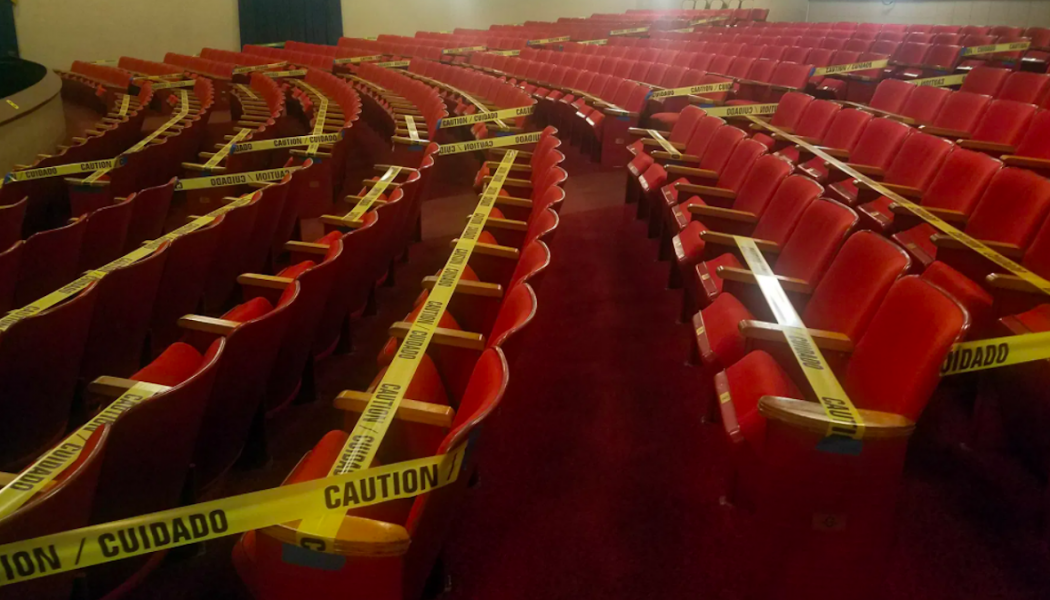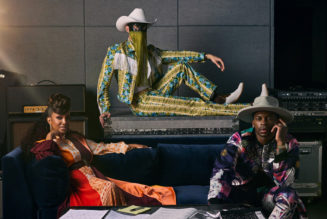
Under conditions that may never be replicated in the real world, German scientists have found that safe indoor concerts are technically possible during the COVID-19 pandemic.
First, the good news. In August, researchers at Martin Luther University Halle-Wittenberg held a concert at Leipzig’s Quarterback Immobilien Arena. Using contact tracing devices and computer modeling, the scientists studied a group of 1,400 volunteers for 10 hours across three different simulated scenarios. In the first, there was no social distancing (this went badly), the second involved moderate social distancing (checkerboard seating, which went much better), and in the third go-round, pairs of people were seated 1.5 meters apart from their nearest neighbors, which produced excellent results. Researchers used fog machines to study air flow patterns and hand sanitizer with fluorescent dyes to help track contact.
The results were announced in a press conference last Thursday and published in pre-print on October 30th. While the study is still awaiting peer review — and that’s not a small caveat — it showed that the strictest hygiene scenario is incredibly promising. In an interview with the New York Times, researcher Dr. Michael Gekle said, “There is no argument for not having such a concert. The risk of getting infected is very low.”
Those words “such a concert” are doing an awful lot of heavy lifting, so let’s break down exactly what “such a concert” looks like. To start, the study took place in an arena with a capacity of over 12,000 people. They let in a scant 1,400 patrons, which is less than 12% of what the venue can hold. For comparison, California has limited movie theaters to 25% capacity in hard-hit areas, while Texas stopped at 75%. Although it would likely vary based on the venue, 12% is a significant reduction compared to even the most aggressive American policies.
Next, let’s look at the changes made to arena staffing. Compared to pre-pandemic, the strictest hygiene scenario called for four times as many entrances. That’s four times as many ticket-checkers and security personnel, which eats into profit margins for venues that are already down to incredibly low capacities.
Then there’s the ventilation, because as Dr. Gekle told the Times, “We knew that ventilation was important but we didn’t expect it to be that important.” They found that the most effective method of air circulation involved jet nozzles in the arena roof aiming fresh air towards the floor. When they skipped the jet nozzles and just sucked in fresh air from outside, they found ten times as many people were ‘infected.’ So not only are venue owners down to 12% or so capacity with increased staffing, most will also need to drastically overhaul their ventilation systems to make this possible. Financially, it might not make sense to hold a concert under these conditions.
Besides that, there are two issues that may become a problem during the peer-review or real-world application process. The first is that all of the volunteers wore N95 respirator masks. These have to be professionally fitted to your face, and as anyone who purchased them or has loved ones in the medical field knows, they make breathing much more difficult. It’s hard to tell from the pre-print, but it doesn’t mention any other kind of mask, and it sure looks like the models assume everyone wears the best PPE on the market. The study might not do a good job calculating risk for people wearing handkerchiefs and neck gaiters. It also doesn’t account for those who position their mask below their nose, those who spend a lot of time eating or drinking, and those who get inside and then stop wearing the mask altogether.
Editors’ Picks
Finally, Paul Linden, a Cambridge professor of fluid dynamics, criticized the set-up of the study’s computer modeling. He told the Times that they forgot to take into account heat rising off the audience, as well as indoor air turbulence. We won’t know until professionals get a good look at the models, and this might be anything from a non-problem to totally disqualifying.
In the meantime, smaller independent music venues are on the verge of catastrophe, and the NIVA has begged the government to save the concert industry from “mass collapse.” Some experts have predicted that concerts won’t return until “fall 2021 at the earliest.”









![Blaqbonez – Breaking The Yoke of Love ft Chike & Raybekah [MP3 Download]](https://www.wazupnaija.com/wp-content/uploads/2023/02/blaqbonez-breaking-the-yoke-of-love-ft-chike-raybekah-mp3-download-6-327x219.jpg)
